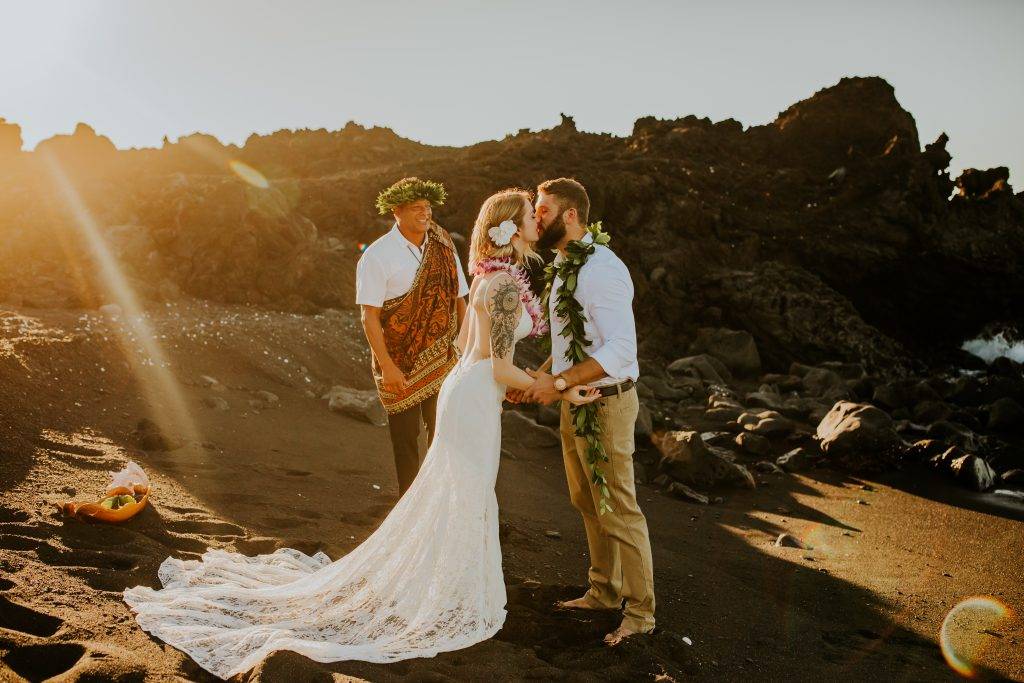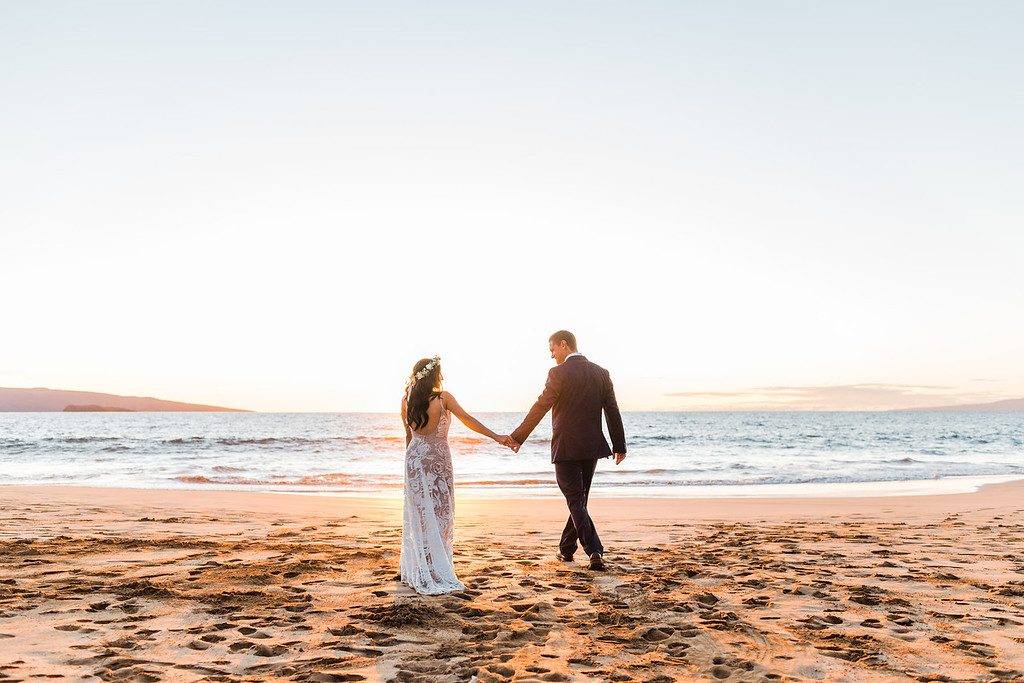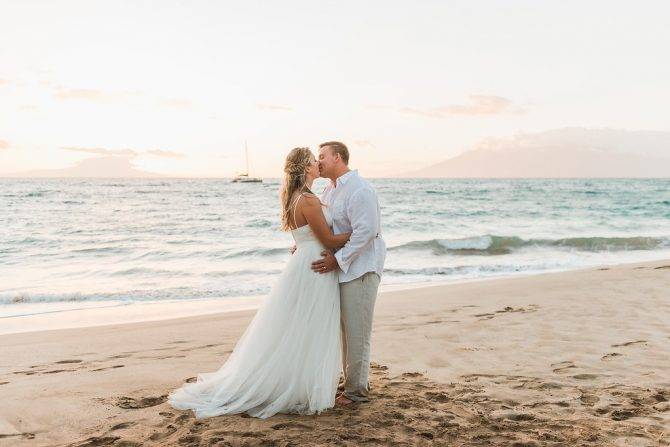Ultimate Destination Wedding Planning Guide
Life happens, weather happens, pretty much anything could happen!

Getting married away from your home turf can be an intimidating process to start. While there is plenty of information about destination weddings available out there (cough, cough, our blog!), it can still feel overwhelming jumping into the planning process. But not to worry! We’ll walk you through our simple guide to planning a destination wedding, so you can put any pre-destination wedding jitters behind you and focus on the excitement your day will hold.
What is a destination wedding?

True to its name, a destination wedding is a wedding in a location you don’t reside in. This can be a place you often visit that has a special meaning to you or a place you and your partner always dreamed of going to. While it can sound pretty simple in theory they can be more complicated to plan than a traditional wedding – especially if your destination is in a different country. Even so, destination weddings and elopements have been steadily rising in popularity over the years. Couples choose planning a destination wedding nowadays because of how intimate and genuine it can be. “All over the world, people are thinking about reclaiming their privacy in an over-connected digital landscape and lessening their impact on the environment,” says officiant Jess Drawhorn. “That’s the feedback I hear again and again from the couples we work with. They want a thoughtfully designed, experience-driven wedding that may result in gorgeous photos but doesn’t exist just for the sake of the photos.”
What are the advantages of a destination wedding?
Compared to a traditional wedding celebration occurring in your hometown, there are some advantages to having your marriage ceremony in a different place besides the obvious excitement that it entails.
If you feel stressed about your destination wedding planning, you can always opt for destination wedding packages. It makes your life so much easier! You can even decide to have an intimate affair. Since this will be happening away from home, you are not obliged to invite everyone you both know. This makes handling your destination wedding budget much easier because you tend to cut the cost of certain things, such as extensive decorations, when you already have a beautiful view.
You can uniquely plan a destination wedding by treating it like a relaxing vacation for you both or a chance to incorporate another culture’s wedding into your own. Just have fun and create memorable moments on your special day. A destination wedding is an excellent chance to have some adventure and focus on your wedding experience. The question now is how to plan a destination wedding? Fortunately, there are a few ways to go about it.
For starters, you can hire a destination wedding planner. These experts are available via both wedding and travel companies, and they can handle all the logistics. From travel plans and budget management, all the way to your accommodations. They’re also an excellent resource for information about your chosen location! They can help you with what you should bring along with you, any essentials necessary for your particular destination, and can even help you field guest’s questions.
However, if you don’t want to spend the extra money — or simply enjoy a bit of a challenge — destination wedding planning can be broken down into four basic parts: Travel plans, guests, budget, and legal requirements.
Travel Destination Wedding Planning Checklist
Traveling is one of the biggest parts when it comes to a destination wedding — hence the name! Whether you’re flying across the globe or driving just a few states away, below are some tips you should add to your checklist and keep in mind before you hit the road, ocean, or air.
If you’re traveling via plane, never check your dress. Even if you have to fold or wrinkle your wedding dress to carry it on with you, the chance of damage or delayed delivery is too high to risk for such a special garment. Just make sure you have a steaming iron or pressing option for your dress when you land and hang your dress after it’s steamed to allow it to “sit.” Most wedding dresses typically leave the store in a garment bag, so utilize that item, no matter what way you’re traveling.
Remember to be flexible. “Life happens, weather happens, pretty much anything could happen!” Drawhorn notes. “If you’re the kind of person who absolutely needs certainty, you can still elope! But it pays to be really honest with yourself in the early days of planning to figure out what punches you can roll with or not.”
While you roll with the punches, make sure you stay informed and up-to-date with anything you may need for your destination wedding. Renew or acquire a passport if you’re traveling out of the country. If you’re staying somewhat local, get your vehicle safety checked before your trip. Also, be sure to check the weather forecast and check into average weather temps for the time of year in the location you’re marrying.
It’s worth noting that making a trip out to your location before your wedding is ideal, if possible. Going to your destination wedding location will help you be more comfortable in the place and to see early on what to expect. That way, you can familiarize yourself with local culture, vendors, and travel routes to and from your venue. This can cut out a lot of stress on your big day and build your excitement for your location.
Booking a Destination Wedding Lodging for your Guests

The best practice when inviting guests to a destination wedding is to notify them well in advance. This will give them time to budget, reserve airline tickets, and take time off work if they need to do some serious travel to share the day with you. If you’re hosting your wedding someplace closer to where you live but still involves a trek for your guests, an advanced notice can allow them time to mark off their calendars.
If your guests are traveling on your wedding adventure with you, look into reserving a hotel block. This is pretty standard for big weddings, plus, you’ll have less organizing to do if everyone is staying in one place. Put together welcome bags with local treats, brochures for activities, and even a ceremony itinerary if you want to be extra-organized.
If you’re not inviting friends or family, still make sure to keep those you love in the loop. Your family likely wants to share in your wedding day celebrations, even if they can’t be there. So send out elopement announcements, or “Save The Date” cards to keep them involved. Ceremony information isn’t necessary to add on these cards, but it can at least provide a heads-up with your wedding date and the location of your nuptials to make your inner circle feel included.
Destination Wedding Budget

The actual price of your destination wedding or elopement is dependent on a lot of factors. Where you’re marrying, the time of year, how long you’re staying, how many people you’re inviting, what you want to wear — the list goes on. When you’re looking at all these factors, reach out directly to companies you’re thinking of working with to get quotes. While they may not have exact numbers, getting as close as possible will assist your planning process.
Always budget slightly over. This will serve as a lifesaver if you have to purchase last-minute extras, like an emergency pair of heels or umbrellas for your crew. It’s even better for bigger ticket items like a flight or hotel change. Plus, any money that you don’t wind up using, you can funnel into your honeymoon!
Speaking of the honeymoon, a great budget hack is to hold your destination wedding where you want to honeymoon. By condensing the location, you’re also condensing the amount you have to spend on travel and hotels. Plus, you’re getting a chance to explore such a special place even more. Two birds, one stone! And that answers the question about how to plan a destination wedding on a small budget!
Destination Wedding Legal Requirements

Be sure to do your research on culture and laws, both local and national, before booking flights or hotels. A great way to ensure your destination wedding ceremony fits the country’s requirements is by reaching out to a planner or vendor you’re considering to get their thoughts on local etiquette.
Ensure you have all the legal documents you need well ahead of time. This includes IDs, passports, visas (if you need one), marriage licenses, anything you don’t have digital copies of that you may need. Tourist or temporary visas can take months to file, so if you need one, make sure to be proactive. Tourist boards can be a great resource for information.
Residency requirements are common to get legally married in many countries but don’t be intimidated by this stern wording. The requirement can be as short as 24 hours, as is the case in the Bahamas, or up to a week in some places in the UK. You often have to meet the residency requirement before you file for a marriage license, so plan for both waiting periods. Make sure you check out all the time requirements for your location ahead of time so that you can plan your ceremony date accordingly.
A destination wedding can be a wonderful, thoughtful, and personal adventure. While they do require more planning than your traditional elopement or wedding, countless resources can help you get to the next stop: happily ever after!




